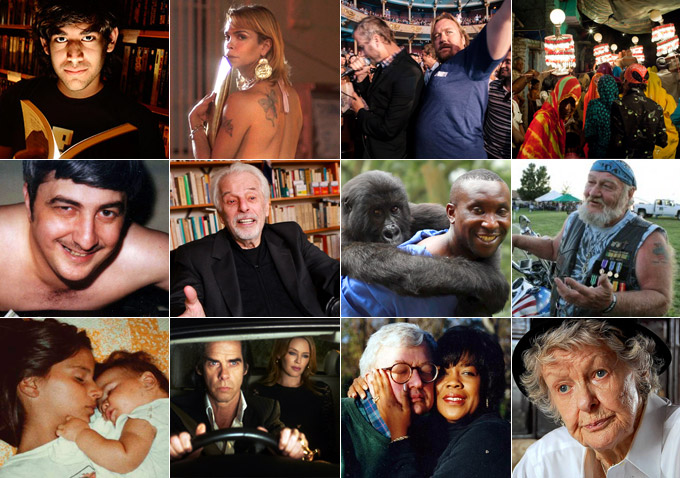
We’ve moved. Our new home is over at THEPLAYLIST.NET. Please update your bookmarks and come on over to our new digs. Thanks for following us all these years, now follow us to our new house.
Truth, the maxim goes, is stranger than fiction. And almost every week there’s a feature documentary hitting theaters or VOD telling a story just as compelling, if not more, than anything that can be found in mainstream multiplexes and $200 million dollar tentpoles.
Unfortunately, it’s relatively rare for these films to cross over to mainstream audiences: the biggest grossing-documentary of the year so far, depressingly, is Dinesh D’Souza‘s borderline-incompetent right-wing propaganda piece "America" (our review, and its attendant 470+ mostly batshit comments, is here). But that’s not accurately reflective, as it has been a very strong year for non-fiction filmmaking so far, and to prove it, we’ve rounded up an easily D’Souza-free list of the best 20 documentaries of the year so far.
Some have hit theaters already, some are favorites from the festival circuit that should make their way towards your eyeballs before the end of 2014. But from histories of colonial Africa to visionary filmmaker what-ifs, from intimate portraits of world-famous rock stars to glimpses of the small-town version of the American dream, from star-driven baseball docs to a biography of the most famous film critic in the world, there should be something here for everyone. Take a look at the list below, and let us know your own favorites of 2014 so far in the comments section.
 “Concerning Violence”
“Concerning Violence”
Director Göran Hugo Olsson certainly has a way with archival footage. In 2011 he released the excellent "The Black Power Mixtape 1967-1975," which used footage shot by Swedish journalists about the black power movement, to present a fascinating new window into a charged time in American history. This time his focus is on colonial Africa, and Olsson’s ambitions are matched by his skill, with the film once again using vintage footage, but with a much headier thesis. Divided into chapters, and using quotes from Frantz Fanon‘s "The Wretched of the Earth" as the sole context, “Concerning Violence” essentially posits that any group of dispossessed people will eventually rise up to balance the scales. And the documentary takes viewers on a rich, fascinating trip through history, pointing out numerous examples in countries like Angola, Mozambique, Liberia and Burkina Faso, where groups and even political leaders, led an active resistance against Western forces. In an era where the line between documentaries and reality TV is beginning to blur, as personalities become their own subjects, “Concerning Violence” is a refreshing change. Olsson’s film is admirably literate, and trusts the audience to go with him into corners of the past that, if not forgotten by history, are certainly not commonly discussed. And they should be, as the message of “Concerning Violence” is that oppression is just one stop in a cycle that will see those underfoot rise up again. [Full Review]
 "Jodorowsky’s Dune"
"Jodorowsky’s Dune"
In the history of the greatest movies never made, Alejandro Jodorowsky‘s attempt at "Dune" certainly ranks amongst the most tantalizingly unrealized. This documentary, energetically directed by Frank Pavich, details the Chilean-French filmmaker’s attempt to adapt Frank Herbert‘s cosmic epic, using a combination of mind-altering metaphysical quandaries with cutting edge visual effects (years before "Star Wars"). Using extensive interviews with creative principals from the failed production and latter day admirers like "Drive" director Nicolas Winding Refn, along with fully animated sequences from the original production illustrations, "Jodorowsky’s Dune" is the closest we’ll come to actually seeing Jodorowsky’s vision come to life. (Most startling is a montage of movies made after Jodorowsky’s attempt that borrow images or ideas wholesale.) Anchoring it all is Jodorowsky himself, who comes across as both a complete genius and a used car salesman, selling a version of the movie that he would never actually have to follow through on. "Jodorowsky’s Dune" acts as both a fascinating time capsule of a tantalizing would-be feature and the cinematic equivalent of an exaggerated fisherman’s tale – Jodorowsky once planned a sci-fi movie this big… [Full Review]
 “Stray Dog”
“Stray Dog”
Debra Granik’s first film since the Oscar-nominated “Winter’s Bone,” “Stray Dog,” a glimpse into the life of the titular Vietnam vet, biker, dog lover, newlywed, RV park manager, grandfather and stepfather, is something of a slow-working miracle. Using no interviews, no voiceover, just a wealth of clips of Stray Dog going about his everyday life, strung together with deceptive simplicity, Granik’s formal rigor allows her subjects to speak for and amongst themselves. And they emerge with stunning clarity and humanism, most of all Stray Dog himself, a man burdened by PTSD (and the heartrending belief that forgiving himself would dishonor the memory of the dead), yet trying, and emphatically succeeding, to embrace life and meet the problems of friends, family and fellow vets, with pure compassion. A summary lesson to any of us who might assume a marginalized life is a narrow one, “Stray Dog” incisively mines what must be a wealth of footage to build an epic fringe-eye view of contemporary America. Offering no easy resolution (nor should it, when the theme of the film is that healing, helping, adapting–everything–is a process) we could wish it didn’t end so abruptly. But then, loving Stray Dog as much as we do by its close we could wish it didn’t end at at all. [Full Review]

We’ve moved. Our new home is over at THEPLAYLIST.NET. Please update your bookmarks and come on over to our new digs. Thanks for following us all these years, now follow us to our new house.
“The Internet’s Own Boy”
In this carefully elucidated portrait, Brian Knappenberger captures the short life of Aaron Swartz, the boy-genius founder of Reddit, equipped with a set of revolutionary ideals, who tragically took his own life in the face of trumped-up felony hacking charges (but not before leading the grassroots effort that struck down the SOPA/PIPA bills). While Swartz is nearly canonized in some circles, his life, work, and beliefs aren’t nearly well-known enough in the mainstream, and “The Internet’s Own Boy” serves to not only introduce him to a new audience, but to chronicle the dramatic events of his sadly cut-short life, in which he anticipated the current debate over net neutrality, copyright law, government surveillance, and freedom of information, and fought dearly to defend these rights and freedoms. An eye-opening, educational, but ultimately riveting, and heartbreaking film, “The Internet’s Own Boy” is the kind of homework we should all be doing. [Full Review]
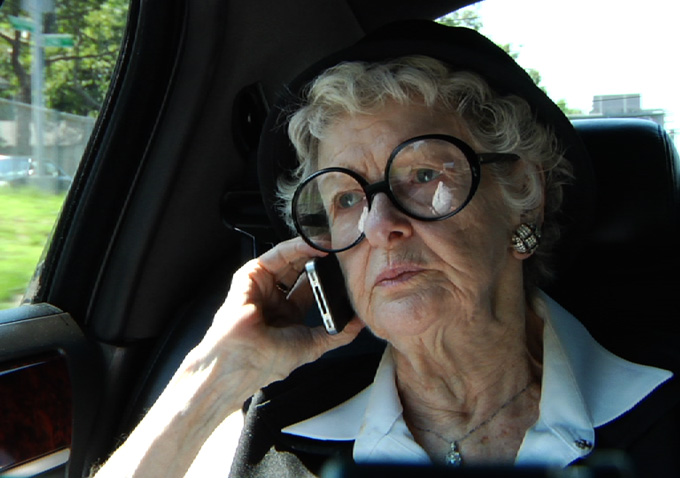 “Elaine Stritch: Shoot Me”
“Elaine Stritch: Shoot Me”
The inimitable brassy Broadway legend Elaine Stritch passed away last week, leaving a tall, stylish, foul-mouthed, completely one-of-a-kind hole in our hearts. Fortunately, we have Chiemi Karasawa’s documentary “Elaine Stritch: Shoot Me” as a testament to Elaine’s unforgettable style and spirit. The film sensitively and intimately portrays the duality of Elaine’s personality: she is at once a fierce, ferocious broad, a seasoned performer who is never without a snappy comeback. But she’s also a sensitive Midwestern gal who still gets stage fright, and speaks with remarkable candor about her nervousness and fears, aging gracefully (it’s not for sissies), alcoholism, the tragedies in her own life and the realities of death. Despite all of the heavy subjects, the film is laugh-out-loud funny, thanks to Elaine’s quick wit and unfiltered personality, and is a fitting tribute to her nearly 70-year career. Ultimately, the truths that she speaks are universal ones in which anyone can find inspiration and solace. If you haven’t already, get to know Elaine Stritch, post-haste. [Full Review]
 “Elena”
“Elena”
John Grierson defined documentary as “the creative treatment of actuality,” a definition that can be stretched to accommodate almost any non-fiction film, and one that best describes Petra Costa’s “Elena.” Almost more of an experimental art film, it takes up the life and memory of Costa’s sister Elena, a beautiful, talented performer who found herself adrift in New York City, away from her home country of Brazil. Devastated by her suicide, Costa herself moves to New York, almost becoming an avatar for the lost Elena, retracing her steps and trying to solve the mystery of her sister’s unthinkable death. Costa’s film is a dreamlike haze of memory, creating and finding the spectre of her sister in home movies, letters, diaries, and her own recollections. Gorgeously photographed and edited, “Elena” weaves together past, present, real-life and the subconscious, creating a cinematic tapestry that serves to reanimate the spirit of her sister, through her words and images. Truly a creative, unique, and transporting experience that tests the boundaries and the possibilities of documentary. [Full Review]
 “Code Black”
“Code Black”
Hopefully, a documentary will make you see something in a different, more enlightened way, and will challenge or complicate your perspective on an issue. In “Code Black,” the audience’s view is privileged by the access of its director, Ryan McGarry, an ER doctor who brings the camera into the birthplace of the modern emergency room, the C-Booth (as it’s known) at LA County Hospital. McGarry focuses on his class of young, idealistic ER doctors in training, a group that is learning what makes the C-Booth such a remarkable place, and trying to translate those values into the rapidly evolving emergency rooms they work in today, stuffed to the gills with people who don’t have access to healthcare anywhere else. It’s not just a history of the C-Booth and a portrait of the people who work there (though it is that); it’s also a portal through which to view the problems that plague the American healthcare system. Despite all the blood, muck, pain, and desperation, the film brings a hopeful, humane perspective to the subject matter, and provides a way to see how this broken system might be fixed. “Code Black” is remarkable and rare view into a place the average person doesn’t always get to experience. [Full Review]
 “The Overnighters”
“The Overnighters”
You know a documentary’s storytelling is really good, like really, really good, when at some point during the third act, you gasp in shock at something that entirely changes your understanding of the film. But that’s not the only laudable part of Jesse Moss’ engaging, troubling, devastating documentary “The Overnighters.” Ostensibly a portrait of the trials of chasing the American dream—as men from around the world pour into small town North Dakota chasing black gold in the form of oil—the film is much more about morality, the choices we make, and the inevitable consequences. Pastor Jay Reinke is the martyr of this modern day Biblical tragedy, a man who seeks to serve others while also battling with his own decisions that affect his life and family. He’s been housing the overflow of workers who can’t find shelter in his church, men with checkered pasts who are on a millennial gold rush, and like Jesus, Reinke welcomes them all, sex offenders, addicts and the like. A story that captures the complicated state of masculinity and the American Dream, “The Overnighters” is not to be missed. [Full Review]

We’ve moved. Our new home is over at THEPLAYLIST.NET. Please update your bookmarks and come on over to our new digs. Thanks for following us all these years, now follow us to our new house.
"Virunga"
The micro is the macro, the macro is the micro; that symbiotic link is explored in the trenchant, powerful and often heartbreaking “Virunga.” Ostensibly about world heritage site Virunga National Park in the Democratic Republic of the Congo and the critically dwindling mountain gorilla population within, "Virunga" is also about the big picture. It’s a disturbing document of all the larger forces of greed and corruption that impact the issue of species endangerment–and mercenary poachers are almost the least of all worries. The ripples of the 1994 Rwandan genocide have created an air of unrest that has not dissipated and a renewed civil war is brewing. Meanwhile, British oil corporation SOCO attempts to further pillage the country’s natural resources by drilling in Virunga-–by law, an illegal act that avaricious politicians turn a blind eye towards. As rebel forces look to get their piece of the pie and fighting begins to encroach, all that stands in the way of the park, its gorillas and its vast array of wildlife is a small team of loyal park rangers (140 of whom have died in direct sacrifice), its director and a passionate journalist looking to expose the oil corporation’s bribery. Compellingly told by director Orlando von Einsiedel, “Virunga” sprawls in scope, beyond simply a doc about a threatened natural habitat and the guardians willing to lay down their lives for it. Showing shocking hidden camera footage of warlords, venal politicians and appallingly contemptible SOCO operations managers, “Virunga” balances this intrigue with intimate and moving footage of the park’s cherished gorillas, many who have forged family-like bonds with its caretakers. Loaded with complex issues that create domino effects, at the heart of the desperate struggle for Virunga is the distressing central issue at hand for many suffering African nations – turmoil, corruption and lack of leadership seen as an opportunity to exploit its most precious assets. “Virunga” is A-grade material and this year’s “The Cove”: a stirring activist call to arms that must be heard.
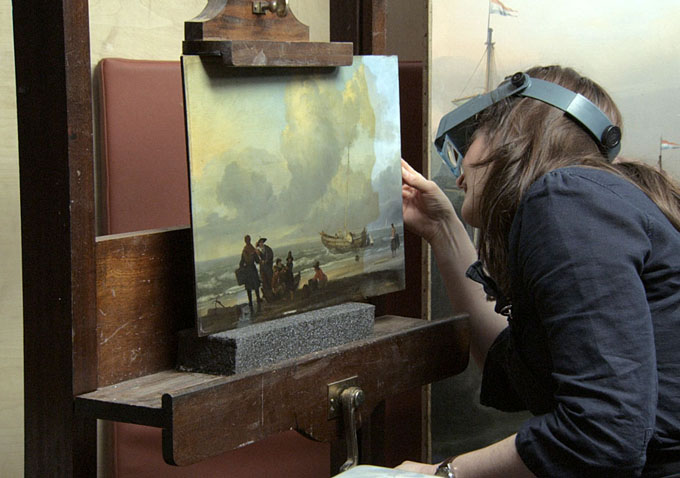 "National Gallery"
"National Gallery"
We’ll probably all take Frederick Wiseman for granted until he’s gone. The 84-year-old documentary master has been knocking out epic, impressive, studies of institutions at a steady rate since "Titicut Follies" in 1967, at such a consistently high level of quality that it’s all to easy to shrug your shoulders and go, "yep, another excellent Frederick Wiseman film." So let’s all agree to cherish these films as they arrive, especially when they’re as good as "National Gallery." Debuting at Cannes barely six months after last year’s "At Berkeley," one of the director’s very finest, this sees the documentarian turn his quietly observing lens on the art world, and more specifically London’s National Gallery, a nearly 200-year-old collection and treasure trove of some of the most famous and important paintings in the world. Weighing in at a positively breezy three hours (compared to the four of "At Berkeley"), the film’s less interested in how the organization ticks (though we get some intriguing glimpses at that too), and more in the work it does, from restoring the artwork to educating the public. And for the audience, one of the great pleasures of the film is getting to hear world-renowned experts talk about the paintings, and the stories and techniques behind them. Sometimes, Wiseman’s reluctance to provide any context leaves you floundering a little, but nevertheless, short of taking the drugs from "Lucy," this is the best way to expand your mind in just three hours. [Full Review]
 "Mistaken For Strangers"
"Mistaken For Strangers"
You’re not truly a famous band or musician until someone’s made a documentary about you, as everyone from the Rolling Stones to Katy Perry will attest to. So it’s fitting that the unlikely rise of The National has been topped off with a cinematic tribute — the band went from cult favorites to stadium fillers and festival headliners in only a few short years after the release of their 2010 record High Violet, and "Mistaken For Strangers" documents, in part, their sudden fame. But the film’s also far more intimate and interesting than that. Rather than some outsider established filmmaker, it’s directed by Tom Berninger, brother of the band’s frontman Matt: a schlubby, underachieving aspiring horror director still living with their parents, who hopes that documenting his time as a roadie with the band will be his ticket to a longer-lasting career. As such, the film focuses as much on the sometimes difficult, sometimes competitive relationship between the pair, as it does on the band, but it gives proceedings both humor and heart, and helps it break out beyond just a fan-only affair. There’s a certain extent to which you don’t quite buy it: it feels unlikely that someone as seemingly hapless as Tom could put together something as compelling. But the semi-artificiality becomes part of the narrative, a sort of "Exit Through The Gift Shop" of the indie-rock world, and it’s such a sweetly told story that you forgive it any tricksiness. And the music’s great, obviously. [Full Review]
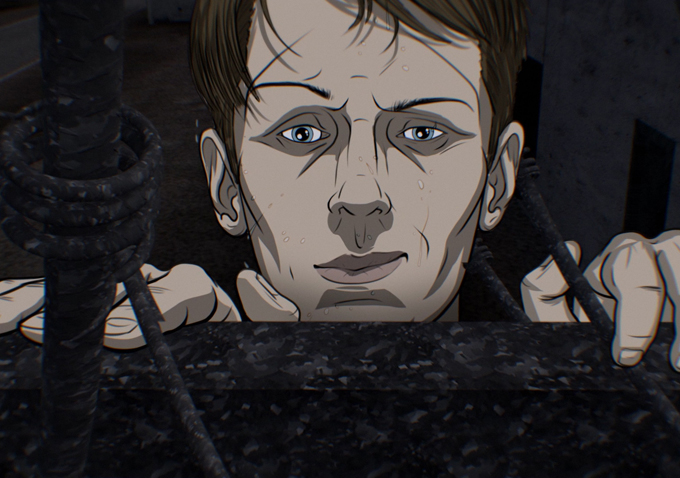 “The Life and Mind of Mark DeFriest”
“The Life and Mind of Mark DeFriest”
This tale of one of America’s most notorious prisoners will haunt you long after it’s over, thanks to the combination of shocking true-life source material and the visceral way in which the film depicts the off-the-wall subjectivity and wild exploits of prisoner Mark DeFriest (animated by Thought Café). Back in the late ‘70s, a young Mark caught 4 years for robbery, but his numerous escape attempts (many successful!) garnered him not only the nickname Houdini, but disciplinary infractions that have interminably extended his stay. Mark was the only non-violent prisoner in Florida State Prison’s hellish X-wing, which is how filmmaker Gabriel London came upon his story, embarking on a 13-year project to depict Mark’s odyssey through the harrowing and labyrinthine American justice system. Mark is reunited, for better or for worse, with the psychiatrist who 30 years ago, deemed him mentally competent to stand trial, resulting in his extended incarceration. Both men are are seeking the path to some kind of redemption, with Dr. Berland reversing his diagnosis, while Mark attempts to trust the man whose assessment resulted in this ugly life for him. What starts as a wild and rollicking prison escape artist tale turns into a haunting and quietly devastating portrait of a man who got caught up in a system that couldn’t properly hold him, so it broke him instead. A rousing indictment of the American prison system, and a film one won’t soon forget. [Full Review]
 "No-No: A Dockumentary"
"No-No: A Dockumentary"
It’s the stuff of baseball legend: on June 12th, 1970, a pitcher for the Pittsburgh Pirates named Dock Ellis threw a no-hitter against the San Diego Padres. This was a nearly magical feat of baseball prowess and sportsmanship, with only 282 no-hitters having been thrown in the entire history of Major League Baseball. But what made this no-hitter (or no-no) so infamous was that Ellis was high on LSD for the entire game. And while that is astounding and hilarious and weird all on its own, the filmmakers outdo themselves by painting a fully dimensional portrait of Ellis as both a baseball player and a human being — a flawed, eccentric character who was always willing to do something outrageous in the name of shaking up a system he never saw himself being a part of in the first place. A trailblazing member of both AA and professional baseball (one heartbreaking moment in the documentary has Ellis reading a note that Jackie Robinson left him, thanking him for all of his groundbreaking accomplishments), Ellis was never an exceptional player, but he was an exceptional man, known for his flamboyance and personal flair. While "No-No" occasionally drifts into gimmicky editorial flourishes, it’s zippy and fun, featuring a funky score by Adam Horovitz from the Beastie Boys, and proof that Ellis was a man worthy of more than just a single trippy story. [Full Review]

We’ve moved. Our new home is over at THEPLAYLIST.NET. Please update your bookmarks and come on over to our new digs. Thanks for following us all these years, now follow us to our new house.
“Rich Hill”
“Rich Hill” feels like a precious artifact that needs to be put in a time capsule to let future generations know what it was like to grow up as a boy in small-town America in the twenty-teens. This intimate deep dive into the lives of three lower-middle-class teenage boys growing up in Rich Hill, Missouri carefully examines the instabilities and insecurities of fledgling masculinity against a backdrop of near-crushing poverty. The film also feels like it’s from a time capsule itself: as much as their struggles are very much indicative of this particular cultural moment, their town feels like something time forgot, a tiny oasis of suburban Americana bliss, a place that seems like it hasn’t changed since the ‘50s. While trafficking in some serious issues like economic woes, broken families, abuse, trauma, and disability, the film never feels like it’s pushing an agenda; this is just a non-judgmental portrait of these lives in this time, and the gorgeous photography and score underline the immersive, hypnotic effect this film has. With deep care and respect for their subjects, directors Andrew Droz Palermo and Tracy Droz Tragos have created a truly moving and edifying film. [Full Review]
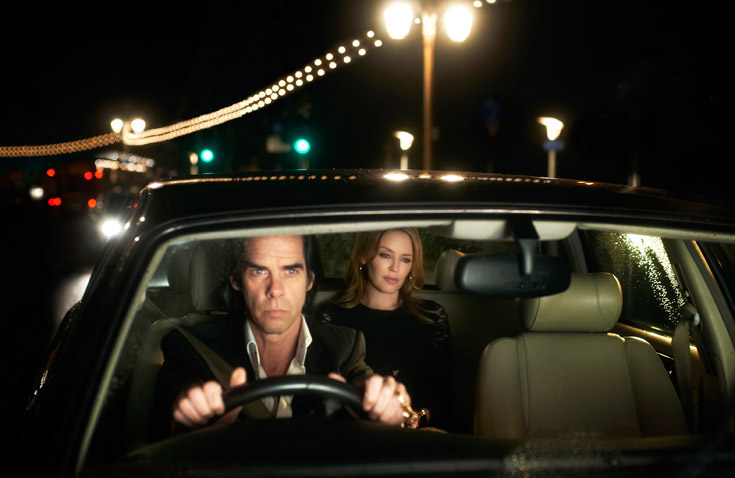 “20,000 Days On Earth”
“20,000 Days On Earth”
It’s strange to come across a film that is at once so undeniably self-indulgent and yet so oddly generous, but directors Iain Forsyth and Jane Pollard, along with Nick Cave himself, somehow pull it off with this beautifully shot, rambling, meta, cameo-sprinkled treat. Mileage will no doubt vary based on your level of Cave fandom, but if you’ve even the slightest inclination toward finding him an interesting presence on the music and movie scene, ‘20,000 Days’ is a fascinating exploration of his evolution as an artist and writer, as well as an examination of the creative process in general. Cave is many things—genial, mercurial, philosophical, lugubrious, prickly—but he is never precious and in fact, though the project is an avowedly self-serving one, often comes across as endearingly self-deprecating: a man enjoying a passionate, dedicated but difficult relationship with his “muse.” Interspersed with dreamlike interludes where Cave talks to the likes of Ray Winstone and Kylie Minogue while driving around Brighton, and a meditation on the nature of memory and the process of archiving to boot, ultimately “20,000 Days on Earth” is about how Cave constructed, and goes on constructing, day by day, the Nick Cave he wanted to be. In fact, by its close it becomes less a rock-doc and more an inspiring how-to for many types of creativity, not least that of creating a version of yourself that you can believe in. [Full Review]
 “Mala Mala”
“Mala Mala”
From directors Dan Sickles and Antonio Santini comes this landmark LGBT doc that follows a group of transgender and transvestite subjects from the seedy nighttime streets of Puerto Rico, into their homes and workplaces and ultimately to the government offices where they unite in support of a bill to criminalize discrimination against the LGBT community by employers. Never sensationalizing nor exoticizing the trans community it portrays, instead “Mala Mala” embraces the idea of sexuality and gender identification as a spectrum in which the only “wrongness” is self-deception, from which the interviewees here are largely refreshingly free. And when the protesters are met with opposition from forces of old-school thinking like the church, the clashes speak more to the priests’ irrelevance than to any real danger they pose for the progressive agenda. In fact, in its normalization and demystification of trans issues, “Mala Mala” may be set with great specificity amongst the LGBT community of Puerto Rico, but, ending on the triumphal note of the passing of the bill, it feels like a glimpse into a brighter future of acceptance and diversity in which we all could hope to share. [Full Review]
 “Battered Bastards of Baseball”
“Battered Bastards of Baseball”
Part of making a great documentary is finding the right story, and filmmaker brothers Maclain and Chapman Way happened to grow up with a doozy of a family. The nephews of Kurt Russell, and grandsons of Bing Russell, the brothers Way sought to depict a little-known piece of family lore: when grandpa Bing went up to Portland, Oregon to buy a minor-league baseball team, shaking up a town and changing the history of minor league baseball in the process. “The Battered Bastards of Baseball” tells the story of the Portland Mavericks, who had a few great years under the leadership of Bing in the 1970s, and the resulting doc is the non-fiction equivalent of sports classics like “Slapshot” or “Major League,” wherein a rag tag bunch of rejects find some magic together, if only for a brief moment. The too-good-to-be true story has already been optioned for a Hollywood version, but the doc is really worth the watch for the tales from the horse’s mouth, including Kurt Russell (a former Mav), team members, and bat boy and filmmaker Todd Field. Not to mention the priceless archival footage of the Mavs in all their shaggy ‘70s glory (it’s worth it for Bing’s loud polyester shirts alone). Simply a great sports-meets-Hollywood story, and and entertaining film that even non-baseball fans will enjoy. [Full Review]
 "Life Itself"
"Life Itself"
The prospect of a documentary about Roger Ebert, the Pulitzer-winning film critic and television personality, isn’t an outwardly exciting one, especially since the documentary takes its name from an already lengthy autobiography of the same name. But what makes "Hoop Dreams" director Steve James‘ film so compelling is that it was clearly meant to be a different film altogether. James seemed to be making a film about Ebert’s succession of health battles, battles that left him physically transformed but intellectually resolute, and how he was able to overcome those obstacles and produce some of the best, most stirring writing of his very long and impressive career. But somewhere along the way, Ebert’s overall health took a turn for the worse, and the documentary became more somber and, ultimately, mournful. James didn’t know it at the time, but he would be capturing candid, emotionally exhausting moments that would end up being some of the last of Ebert’s life. Occasionally the movie is magical and transformative, other times it borders on the banal, but Ebert himself comes through in every frame—in his crackling intelligence, his unwillingness to give in, either editorially or in his prolonged cancer treatment, and his love of film, something that never wavered even towards the very, very end. Film criticism isn’t a terribly dramatic or emotional profession by nature, but by the conclusion of "Life Itself," you’ll most likely find yourself choking back tears. [Full Review]

We’ve moved. Our new home is over at THEPLAYLIST.NET. Please update your bookmarks and come on over to our new digs. Thanks for following us all these years, now follow us to our new house.
"The Dog"
Sidney Lumet’s 1975 crime drama “Dog Day Afternoon” was inspired by a true-life bank Brooklyn robbery in 1972, it was nominated for five Academy Awards and it cemented Al Pacino’s reputation as one of the greatest working American actors of that era. But what of the man behind it all? Ten years in the making, Allison Berg and Frank Keraudren’s “The Dog” is the portrait of John Wojtowicz’s the American bankrobber that inspired the aforementioned picture. Naturally charismatic, Wojtowicz is also dyed in the wool old school Brooklyn: in your face, loud and colorful. And of course, his story is much wilder than that depicted in “Dog Day Afternoon.” John is a lover, a husband, a father, a soldier, an activist, mama’s boy and bank robber. And by his own admission he’s a libidinous non-discriminating polysexual “pervert” who married both men and women – often keeping these relationships all going at the same time. Entertainingly told, John’s countless boasts about his sexual exploits and the bank robbery begin to get old, but then the movie turns towards a portrait of identity and identity lost. The man had multitudinous facets to his character and could be all things at once. Sadly, in his later years he is mostly consumed by his fading claim to fame and is defined by the caricature. Perhaps uneven in focus, because Wojtowicz recodes his past in the manner he sees fit, “The Dog” is still a fascinating portrait of criminal who ultimately was just looking for love and his place in the world.
 "Tomorrow We Disappear"
"Tomorrow We Disappear"
As society grows without scale, not only are animals, becoming endangered, but so is culture, tradition and people and where does the commodification of it all end, it if ends at all? These troubling ideas of gentrification are explored in Jimmy Goldblum and Adam Weber distressing documentary “Tomorrow We Disappear.” Set in the slums of Delhi, ‘Disappear’ centers on the Kathputli colony – a small, but culturally rich community of street performers, magicians, acrobats and puppeteers living in shanty town squalor. The last of their kind, and part of a tradition that has been handed down generation after generation, when their land is sold to developers in favor of high rise luxury buildings their community is thrown into disarray. Trying to fend off relocation, they must fight bureaucracy, corruption, but also painfully their own dysfunction, lack of leadership and opposing ideas, much of it rooted in fear, ignorance and mis-education. It’s a powerful and heartbreaking doc, once again demonstrating the rich deeply exploiting the poor. Upon the verge of being displaced, it’s all the community can do to hang on to their mystical Indian folkarts, so the picture raises the question of preservation, but there aren’t many easy answers. If there’s a familiar-sounding musical thread throughout that tugs at your heartstrings without ever sounding manipulative, that’s because the score is by Dan Romer, the musician behind “Beast Of The Southern Wild.” Whether these wild birds will be here tomorrow remains in doubt, but their potential flight into faded memory is a chilling reminder of the cost of progress.
There are several other titles that we simply haven’t caught up with yet, despite ourselves, but are anxious to do so soon: “Finding Vivian Maier,” about the rediscovery and reclamation of the work of a previously unknown 1950s street photographer; “Manakanama” which documents a pilgrimage to the titular Nepalese temple; and "Finding Fela," Alex Gibney‘s portrait doc of the great jazz/funk African afrobeat artist Fela Kuti.
And of course, there were some films that missed the cut, even though we admired aspects of them. Playlist contributor Nikola Grozdanovic said the elderhood film "Alive Inside" will "likely end up being one of the most important documentaries of the year," so you could see than one on our year end list. Having finally caught up with “Tim’s Vermeer,” we enjoyed it greatly, but more for the project it details than anything hugely groundbreaking in the film itself. Similarly “1971” (reviewed glowingly here) is a very competent retelling of an interesting and largely forgotten piece of civil resistance history, but feels just a little more small-screen than some others here. We were not all as passionate about Joe Berlinger’s “Whitey” as our reviewer, though it’s a solid, illuminating look at Boston crime boss Whitey Bulger; “The Final Member” (review) is an enjoyable, quirky, but slight story of a man and his penis museum; while “Supermensch: The Legend of Shep Gordon” was a tough exclusion, as certainly our reviewer liked it a lot. "Ivory Tower" (review) is a sobering look at the higher education system
that does effective work of laying out the problems but less so of
suggesting solutions; while the thorough "The Case Against 8" (review)
made us long for a more inclusive history of the Proposition 8 movement,
rather than just a legal one.
We never had a chance to review it, but “When the Garden Was Eden,” Michael Rapaport’s love letter to the Knicks, is definitely worth a watch, especially if you’re a lifelong fan of the team or a native New Yorker. Swedish House Mafia doc “Leave the World Behind” is a fitting salute for fans but doesn’t deviate too much from standard rock-doc format (review). “Sepideh,” (review) about the challenges faces by a young Iranian woman who wishes to study astronomy and “Maidentrip” (review) about a Dutch teenager sailing around the world solo, are both important, intimate, narrowly focussed stories of pioneering young women; “Art and Craft” (review) is an absorbing tale of forgery and authenticity in the art world; while perhaps because we hold him to such a high standard, we were a little disappointed by Errol Morris’ Rumsfeld doc “The Unknown Known.” In fact, the high standard of this honorable mention list overall is very heartening, especially considering we’re only a bit more than halfway through the year, and goes to prove, if anything, that the quality, breadth and scope of documentary filmmaking (which seemed to enjoy a banner year in 2013) is only growing with time.
– Katie Walsh, Jessica Kiang, Kevin Jagernauth, Rodrigo Perez, Drew Taylor, Oliver Lyttelton

